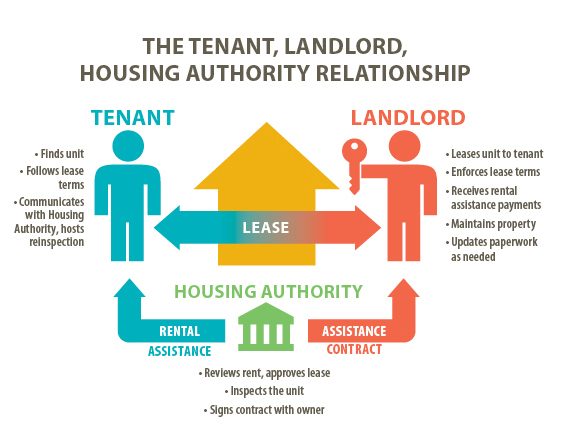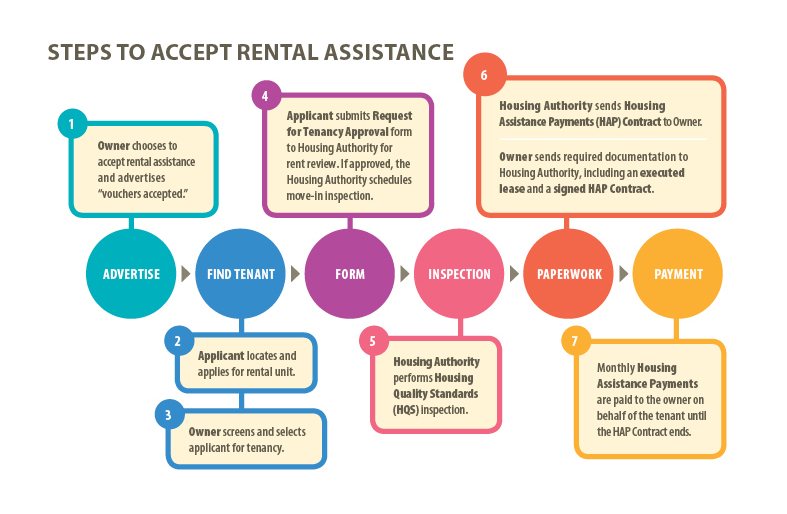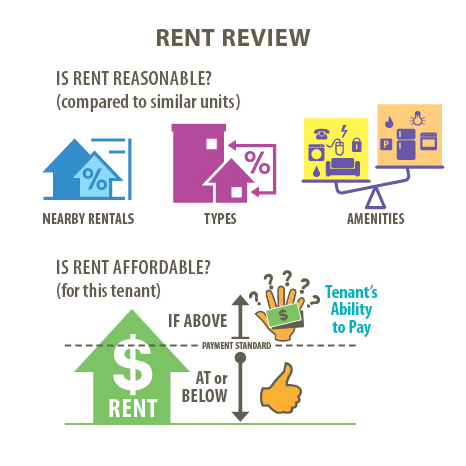Housing Choice Voucher Owner and Manager FAQ
What is the benefit to landlords?
In addition to helping individuals and families afford a stable, safe home in our community, there are several benefits from our partnership:
- Timely, guaranteed rent payments. In 2019, the average per-unit rent assistance payment to Twin Cities partner landlords was $865/month ($10,377 per year).
- Reduced turnover and vacancy costs. Twin Cities voucher-holders average 7 years since move-in.
- Responsible tenants. Rental assistance is scarce and few eligible people succeed in securing a spot on a waiting list. After waiting years for assistance, voucher-holders are motivated to care for their apartment and follow lease terms, or they risk losing their assistance and their home.
- Responsive customer service. At most Housing Authorities, a single point of contact answers questions and connects you to the best person to provide timely assistance.
- A problem solving partner. Housing Authority staff are trained to support tenants when requested and to remind tenants of their lease obligations, so their problems don’t become your problems. Staff can also help you work through issues or refer you to landlord/tenant mediation.
- Free inspections. A trained professional provides free annual inspections to ensure the unit is habitable and residents in your unit are safe, helping the property retain its value.
- Satisfaction from helping others.

Why is it important to become a landlord partner?
Our housing resources haven't kept up with our growth, and it is increasingly difficult for individuals and families to find a home:
- Since 2000, renter households have seen an over 64% rise in monthly rent with only a 42% increase in median income.
- The limited number of affordable housing options has resulted in a 10% increase in families and individuals living without shelter between 2015-2018.
- Wage and fixed income increases haven't kept pace with the high cost of housing; low vacancy rates limit people's housing choices (3.2% vacancy across all rental homes; 0% vacancy for subsidized homes).
- Housing costs burden many Twin Cities residents; one in two households pay more than 30% of their income to have a home.
What happens when a landlord decides to accept a tenant who has rental assistance?
The process of renting to an applicant with a voucher is similar to renting to a family who does not have assistance. There are several rental assistance programs, and all programs work in a similar way. This information references forms and requirements for the most common program, Housing Choice Vouchers, also known as Section 8.
You screen and select tenants using your standard screening criteria. After you approve the applicant for the unit, the voucher-holder will ask you to complete a Request for Tenancy Approval form. The Tenancy Approval form asks questions about the rental unit, including unit address, contract rent amount, security deposit amount, description and year the building was built, utilities that are included and excluded in the rent, and landlord contact information. The tenant must return the completed Tenancy Approval form to the Housing Authority.
When the Housing Authority receives the completed Tenancy Approval form:
- They check that the rent is affordable for the applicant and is reasonable compared to similar units.
- When the unit rent is approved, they schedule and notify you of the Housing Quality Standards (HQS) inspection date. The notice includes a guide so you know what to expect and can prepare for the inspection. They cannot release payments to you until the unit passes the inspection.
- Once the unit passes an HQS inspection, you sign the lease and collect any remaining security deposit from the tenant. After The Housing Authority approves all paperwork, they send you a Housing Assistance Payment (HAP) Contract with the Housing Authority to sign and return and payments begin.

How does a landlord get involved in a rental assistance program?
A landlord becomes involved when an applicant with rental assistance contacts you. The person looking to rent a home will tell you that they have a voucher and ask if you are willing to work with them and participate in the program.
To advertise a rental unit where you accept rental assistance, include "Vouchers Accepted" or "Rental Assistance Accepted" in your listing. Landlords can advertise for free with HousingLink.
What are the initial and ongoing requirements to accept rental assistance?
Housing Authorities work to make the process as easy as possible. There are 3 requirements to participate:
- Complete paperwork prior to the initial move-in.
- Promptly report any proposed changes in the rent agreement or lease terms, and lease violations.
- Provide housing that meets HQS Inspection Standards. Inspection occurs at initial move-in and annually or biennially. Landlords usually are not required to attend re-inspections.
What is the process to register a building or get certified to participate? How does a landlord advertise to individuals and families who have rental assistance?
There is no pre-approval or certification process. Become a partner landlord by advertising units with "Vouchers Accepted" or "Rental Assistance Accepted," and advertise on the free HousingLink listing service.
When will the inspection take place?
The initial inspection happens before the tenant first moves in. The Housing Authority will send you an inspection date notice. The annual recertification process may include an inspection scheduled directly with residents. Landlords are not expected to attend recertification inspections.What kind of inspection is it?
The inspection follows federal protocol, and the official name is a Housing Quality Standard (HQS) inspection. The purpose of the inspection is to ensure that the people moving into your rental unit are safe. Click here for more information on inspections.What if the unit fails the inspection?
The Housing Authority will notify you of the failed items and schedule a re-inspection. Missing smoke detectors and CO2 detectors are the most frequent inspection fails. Click here for an inspection checklist to help you prepare.Are there limits on rents?
Landlords have full discretion setting rents, and you should set rent at a reasonable level for the location and condition of your unit. Each person with rental assistance can afford a different amount, and applicants know what rents they can afford. The Housing Authority reviews the rent and utility allowance to determine if they can approve the rent for a particular applicant.
The Housing Authority looks at two factors. First, some rents may not work for families with very low incomes, as residents generally cannot pay more than 40% of their income in rent and be eligible for the assistance. Second, the rent must be reasonable when compared to similar nearby rental homes. Both factors consider resident-paid utilities. Housing Authorities typically complete and contact you with the review results within three days of receiving the Request for Tenancy Approval form.

How does the Housing Authority assess if rent is “reasonable?”
“Reasonable” is assessed based on federal rules. The Housing Authority compares the rent in your lease to rent for similar units nearby or in similar neighborhoods. Units are similar if they are the same size and type, and if they have similar amenities, services, age, or maintenance. Rent is reasonable if it is in line with rent in similar units. Rents may not be approved if similar homes nearby rent for less.
Is the Payment Standard the maximum allowable rent?
No, the purpose of the Payment Standard is to guide the Housing Authority in situations where program participants have no or extremely low incomes. Many individuals and families with rental assistance work or receive other income. Many can afford rents above these amounts.
How much does the tenant pay for rent and how much does the Housing Authority pay?
Housing Choice Voucher tenants typically pay 30% of their monthly income in rent directly to the landlord. This will vary for each family and the rent portions may fluctuate during the year. The Housing Authority pays the rest of the rent directly to the landlord each month. How rent is shared varies by program. For example, some rental assistance programs pay a fixed amount of assistance on behalf of all participants. In all cases, the Housing Authority will let you know what portion of the rent you will collect from the tenant and what you will collect from the agency.
The rent is higher than the Housing Authority will allow. The family has offered to pay the difference. Is that ok?
No. That is considered fraud. All payments between a landlord and tenant need to be disclosed in your lease. The Housing Authority sets the portion of rent the tenant is responsible for. In this case, you can choose to lower the rent or tell the family you are not able to work with them.
What should a landlord do if the rent changes?
If the rent changes after the initial term of the lease, you must provide 60-day written notice to the Housing Authority.
Does the Housing Authority screen individuals or families for the landlord?
No. The Housing Authority does not screen residents for rental or credit history. Screening and selection is the responsibility of the landlord. Screen prospective tenants using your standard screening criteria. We recommend you check references of all applicants (assisted and non-assisted) for past rental history. The Housing Authority may be able to provide known contact information for the resident’s current and previous landlord.
When and how are landlords paid rent by the Housing Authority?
You can expect the Housing Authority payment on the same date each month, typically the 1st business day. Housing Authorities pay rent via direct deposit or mailed checks.
Who decides which utilities are or are not included in the rent?
The landlord decides who pays for which utilities. If the tenant is responsible for some or all utilities, list it on the Request for Tenancy Approval form. Utilities are part of assessing whether the rent is affordable to the family and whether the rent is reasonable.
What happens if a resident damages their unit, violates their lease, or “skips” or vacates a unit without proper notice?
Landlords enforce lease terms as with any tenant. Housing Authority staff work to improve the success of every tenancy. Tenants who violate their lease can lose their rental assistance. Housing Authority staff enforce program rules, protecting both tenants and landlords. For tenants, one of those rules is complying with the lease. We encourage landlords to copy the Housing Authority any time you issue a lease violation to a tenant with rental assistance.
The Housing Authority is available to help tenants and landlords communicate about tenant or property concerns. They may provide a referral to landlord/tenant mediation services, such as those found at Community Mediation Minnesota or HOME Line. Housing Authority staff can also connect tenants to resources beyond rental assistance.
Who can answer other questions?
Contact the Housing Authority for your area. Find them on this map.
